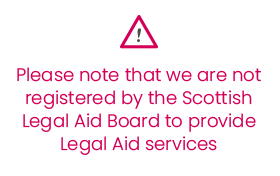Special Guardianship Orders Glasgow, Scotland
Many people assume that they will be able to make decisions on behalf of a loved one or family member who is incapacitated or unable to make their own decisions. This is not automatically the case, and in most instances legal authority will be required to allow you to make decisions on someone else’s behalf. Ensuring that you have the correct legal arrangements in place for you and your loved ones can make life easier when difficult circumstances or decisions arise.
What is a Guardianship Order?
A Guardianship Order is an appointment by the court of a responsible person or persons to look after the interests of an individual once it is established that the individual has lost capacity to make decisions, most commonly as a result of mental or physical illness. Once appointed, a guardian will have legal authority to make decisions on behalf of an individual in accordance with the principles of fairness and reasonableness. The guardian will also be required to consider the adult’s past and present wishes and the views of the adult’s family members and carers when making decisions on their behalf.
A power of attorney is different from a Guardianship Order as it is signed before an individual loses capacity. Everyone should consider putting in place a power of attorney to make important decisions on their behalf in the event of an unexpected or unforeseen illness, accident or incapacitating incident.
What Powers will a Guardianship Order Confer?
The type of guardianship powers applied for will be dependent on the needs of the adult, their level of incapacity and the personal circumstances of the applicant. A guardianship application can be made to appoint a financial guardian, a welfare guardian or both. A Guardianship Order can also seek specific powers from the court; this may reflect a complex or unusual need of the adult requiring support, or be necessary as a result of the individual circumstances of the applicant. A Sheriff will review the application and other reports and evidence submitted before arriving at a decision on the nature of powers granted under the application. Our team of solicitors will be able to advise on what type of application will be most appropriate in your personal circumstances and discuss the nature of responsibilities you may wish to adopt on behalf of the adult requiring support.
Who can Apply for a Guardianship Order?
A Guardianship Order can be sought by anyone who has an interest in the adult; this may be a family member or friend of the adult. Accepting responsibility for decision-making on behalf of another person is a significant undertaking; our Guardianship Order Solicitors can advise you of the various groups and organisations that provide practical support and advice to court-appointed guardians.
When Should You Apply for a Guardianship Order?
The UK’s ageing population means that more and more people are living longer, however, the number of people suffering from incapacitating illnesses has also increased. If an adult is suffering from dementia or another form of mental illness or disability, their capacity to make reasoned decisions diminishes, often becoming progressively worse over time. Understanding that a person is no longer capable of looking after themselves and seeking a court-appointed guardian is one of the most effective ways to safeguard their future wellbeing.
Guardianship Orders are most commonly required in circumstances where:
- The individual is no longer capable of making decisions to safeguard or manage aspects of everyday life, for example, in relation to their property, general welfare, a medical condition and consent to medical treatment, care needs, finances, etc.
- The individual requires someone else to make important decisions on his or her behalf owing to a learning disability, accident, or mental or physical illness.
How do I Apply for a Guardianship Order?
Notice must be given to the relevant local authority of your intention to seek a Guardianship Order in relation to an adult struggling with incapacity and requiring additional support. The local authority will appoint a mental health officer to determine the necessity of the order and the suitability of the applicant as the proposed guardian. The mental health officer’s report, together with two further medical reports confirming the extent of the adult’s incapacity, will be submitted to the court as part of the guardianship application. It is vital that these reports are as up-to-date as possible as the court will not accept reports older than 30 days from the date of the assessment.
The court will consider whether the application satisfies the relevant legal tests before granting the application or setting a further hearing if more information is required or if the application is opposed. Our team of experienced Private Client Solicitors will ensure compliance with the necessary timescales and guide you through the court process from start to finish.
As well as specialising in matters concerning Special Guardianship Orders we offer a full range of Family Law services.
Contact our Guardianship Order Solicitors in Glasgow, Scotland
For legal advice specific to your unique personal circumstances, contact Miller Samuel Hill Brown. Our Private Client Lawyers are experts in family and elder care matters; we will apply our in-depth knowledge and years of experience to your specific circumstances and tailor our advice to guarantee a service that meets your needs. We provide personable and practical advice with a view to providing support and legal guidance during challenging personal circumstances.
For advice concerning Guardianship Orders, or any other matter concerning your family and loved ones, please contact us on 0141 221 1919 or complete our online enquiry form.


















